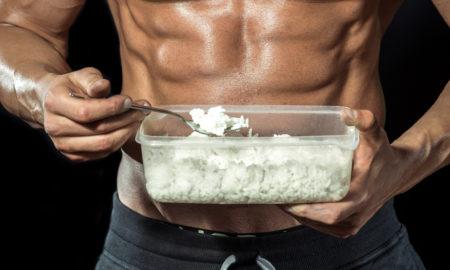

Muscle Recovery
Muscle recovery is a vital part of your body’s healing process. It’s the time between workouts when your muscles are most vulnerable, and the more time you give them to heal, the better.
After all, if you don’t give your muscles enough time to recover from an intense workout, they’ll be weaker than before you started and won’t be able to perform as well in future workouts.
So how do you ensure that your muscles recover faster? This article will give you the information you need to maximize and quicken your muscle recovery to feel good again.
How to Maximize Muscle Recovery
Muscle recovery is the most significant determining factor in how fast your muscles will grow and what kind of results you will achieve. It’s a fundamental goal to experience more rapid progressions in your weightlifting program, training frequency, and time under tension. The following are the best ways to maximize and speed up muscle recovery.
Eat Healthy Food
The primary way to recover from exercise is to eat healthy food. The food supplies the body with the proper nutrients and energy it needs to repair and grow muscles. A good diet consists of the following:
1. Lean Protein
Protein is one of your body’s most essential nutrients to function correctly. It’s a vital component of all bodily tissues, including muscle tissue.
When you exercise, you create micro-tears in your muscles as they work against resistance. Protein helps repair these tears by building new tissues, increasing muscle strength and endurance.
Your body also uses protein to create new cells that help recover and repair after workouts. These include satellite cells found in the muscle fibers, improving damaged muscle areas. It also helps prevent muscle loss due to the breakdown of nutrients in your body.
Research shows that consuming 20 to 40 grams or 0.4 to 0.5 g/kg of your body weight is enough to increase muscle growth.
The best sources of these nutrients are:
- Chicken and turkey breasts,
- Lean meat (lean beef, ground beef
- Fish (salmon, trout, tilapia)
- Poultry and eggs
- Legumes
- Low-fat dairy products such as cottage cheese and Greek yogurt
2. Carbohydrates
Carbohydrates are an essential component of your post-workout recovery. They provide the fuel your body needs to replenish its glycogen stores, which are depleted by exercise, supporting muscle recovery.
However, you have to consume them in the right way. If you’re not eating enough carbohydrates during or after your workout, you can delay recovery and put yourself at risk for overtraining and injury.
Try to consume carbohydrates before exercise and again after training sessions so your muscles have enough energy to perform at their best during work out.
If you want to restore energy stores quickly in less than 4 hours, the International Society of Sports Nutrition advises taking 1.2 g/kg of your body weight. But it should be every hour with an emphasis on carbs with a glycemic index (GI) of 70 or more.
The best sources of carbohydrates for muscle recovery are low in fat and high in fiber, which makes them easier to digest and absorb into your bloodstream. They include:
- Sugar
- Potatoes
- Brown rice
- Whole grain, whole grain bread and cereals
- Whole grain pasta
- fiber-rich carbs include beans and lentils
3. Healthy Fats
Fats help repair damaged muscle cells (glycogenolysis) and increase the strength of other cells in your body (lipolysis). Healthy fat also increases blood flow to the muscles, helps you feel fuller longer, and reduces cravings.
Good fats include omega-3 fatty acids, olive oil, fish oil, nuts, avocados, almonds and coconut oil. Seeds and vegetable oils can also be part of your diet.
Drink Fluid
Drinking water after working out is essential as it replenishes the water lost during the exercises and keeps your body hydrated.
When you are hydrated, your joints stay lubricated—which wards off pain and aches, contributing to muscle recovery. Proper body hydration also prevents muscle cramps and dizziness during and after the workout and regulates the body temperature.
According to a recommendation by the American College of Sports Medicine, you should drink 16–24 ounces of liquid for pounds lost during exercise.
Apart from water, you can consume other healthy fluids to help you recover your muscles. For instance, drinking tart cherry juice could minimize inflammation, soreness, and muscle damage. You can also take watermelon juice or beet juice.
Take Supplements
Numerous supplements operate in various ways to aid with muscle recovery. Some supplements function by promoting or improving muscle protein synthesis, the process by which muscle cells produce more protein.
Other supplements help with muscle healing by reducing muscle soreness that occurs shortly or long after the exercise due to the accumulation of lactic acid in the muscles.
Some also work by reducing fatigue in muscles by giving them the energy needed to continue as they recover. Below are the top five supplements you may take to maximize muscle recovery:
- Creatine monohydrate supplement—increases muscle strength and muscle recovery
- Protein supplement—The best supplement for muscle recovery, especially whey protein supplement
- Magnesium supplement— helps in muscle recovery by relaxing the muscles.
- Fatty acid supplement—supplies muscles with energy and reduces inflammation. It also reduces lactic acid accumulated in the muscles with the help of a medium-chain triglyceride fatty acid (MCT)
- Branched-chain amino acid (BCAA) supplement — contains amino acids that help in muscle growth and recovery, reduce fatigue and ease soreness.

Balanced Diet
Eating a balanced diet is the best way to prevent muscle soreness after a workout. Studies have shown that athletes who eat a diet rich in protein, carbohydrates, and fat recover better than those who don’t.
Eating a balanced diet also prevents you from becoming nutrition deficient, which could hinder your muscles’ capacity to recuperate.
Your diet should include protein, carbohydrates, and fats in proper proportions for muscle recovery. It should also have other vital nutrients such as vitamins, minerals, and enzymes essential for proper metabolism.
If you’re not sure what to eat or how much you should be eating, a good rule of thumb is to:
- Limit your intake of ultra-processed meals.
- Consume a lot of fruits and veggies
- Consume between 1.4–1.8 grams of protein per kilogram of your body weight
Lifestyle Habits for Muscle Recovery
You should practice the following lifestyle habits to maximize your muscle recovery.
Enough Sleep
Sleep allows your muscles to recover from vigorous exercise. Sleep deprivation, on the other hand, may hamper muscle repair by inhibiting the body’s inflammatory response and the production of hormones that help muscle growth and repair. This may lead to several health problems, including muscle atrophy.
If you exercise vigorously, you will require more rest than the usual individual. According to reports, some bodybuilders sleep 10 hours or more per night.
Have Massage
Many athletes use massage to minimize muscle soreness during training. The most frequent type of massage is foam rolling, which uses a foam roller to break up muscular adhesions that can cause soreness or impair performance.
Foam rolling further enhances joint function and injury prevention. It is good to foam roll before workouts to loosen up and increase muscle function. Also, do it after the exercise to flush out toxins and lactic acid from a muscle.
Massage guns can also help you with the massage. You only need to follow the product instructions for guidance to use.
Practice Active Recovery
Active recovery—light exercise performed during the recovery period (for 5 to 6 minutes)—may enhance blood flow to the muscles, which helps alleviate pain in the muscles.
Performing mild exercises like stretches could also reduce muscle tension, improve mobility, and encourage the flow of oxygen and nutrients to tired muscles. These effects all support repair and muscle recovery, aiding in building a more muscular body.
Active resting includes light exercises like stretches, light jogging, and swimming.
Practice Hydrotherapy
Hydrotherapy, commonly referred to as water therapy, uses water for therapeutic purposes. There are many types of immersion hydrotherapy you can do for muscle recovery. Some of them include the following:
Contrast Water Therapy
Contrast water therapy is a sequence of brief immersion in warm and cold waters. The temperature difference promotes the contraction and dilatation of the blood vessels as well as changing your heart rate, which according to a study, may assist lessen muscle soreness after an exercise.
Ice Water Bath
After a strenuous workout, many athletes engage in ice bath training, which involves jumping in ice baths.
Ice baths assist in reducing inflammation and allow for a faster recovery. All you have to do is fill your bathtub halfway with cold water and add ice cubes. Immerse in cold water for 10 minutes.
Things to Avoid for Your Muscle to Recover Faster
Below are four things you need to avoid for your muscles to recover faster.

Alcohol
Alcohol slows down your body’s ability to heal and repair muscle tissue by reducing blood flow to the muscle tissue. Alcohol can also cause dehydration, making your muscles feel stiff and sore.
According to research, drinking alcohol after cycling reduces the muscles’ ability to replace glycogen following endurance exercise. Alcohol also inhibits protein synthesis, a vital component of muscle recovery.
Heavy Workouts and Overtraining
Your muscle needs time to recover, which is impossible if you do heavy workouts before they heal. Wait at least two days after working out before you work out that body part again, or else your muscles will not have recovered enough for the next workout.
Overtraining also contributes to muscle soreness which may hinder muscle recovery. The most uncomplicated strategy to avoid painful and sore muscles and enhance recovery is to adopt a progressive training program in which workouts gradually get more complex as you become stronger.
Tobacco
Avoiding tobacco is one of the best things you can do for your muscle to recover faster. Tobacco use is linked to an increased risk of joint disease and bone fracturing. There is also some evidence that smoking increases the risk of muscle injury.
Stress
When stressed, your body produces cortisol, a hormone that slows down the process of muscle recovery by inhibiting protein synthesis.
Also, since cortisol breaks down molecules, it might hasten the breakdown of protein into amino acids and sugar, which results in muscle usage as an energy source inhibiting quick muscle recovery.
Try to avoid or manage your stress so that it does not interfere with your muscle recovery process.
Conclusion
Whether training to lose weight, stay in shape or build muscles, the best strategy to enhance muscle recovery more effectively is a nutritious diet and enough sleep.
By implementing some or all of these tips, you can ensure you maintain control over your muscle mass and continually improve – for the better.






















You must be logged in to post a comment Login